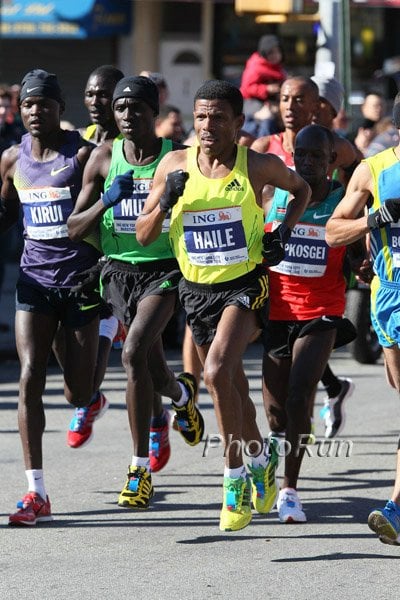VIA sportsscientists.com
A full month has passed since my last post – my sincere apologies for the silence. Given the posting “funk”, it was always going to take a big news story to re-ignite my writing, and that story was provided in New York on Sunday. Not by the victories of Kiplagat and Gebremariam, but rather by the post-race retirement of perhaps the greatest distance runner we’ve ever seen, Haile Gebrselassie.
Evidence of how significant that announcement was comes from the Times newspaper in the UK, where I’ve been for the last two weeks. The Times is a top newspaper and comprehensively covers pretty much all the world’s sport. But on Monday, the actual New York result was reduced to a single paragraph in a piece about Gebrselassie’s retirement, and that was only to mention how his last words before stepping off the course were to encourage his countryman Gebremariam to “catch up with the others”.
A stellar career
Gebrselassie was the sport’s brightest light for close to 20 years. Usain Bolt is now the name that everyone recognizes, inside and outside the sport, and Gebrselassie probably didn’t achieve such wide appeal (such is the nature of 100m running compared to distance running). However, within athletics, he was transcendent.
His star first shone in 1991, when he won the 5000m-10000m double at the World Junior championships. This was followed up by 10,000m gold in Stuttgart, the first of four such titles. And then in 1994, the world record feast began. When Gebrselassie “arrived” to the scene, the 5000m world record stood at 12:58.39 (Said Aouita) and the 10,000m record was 26:52.23 (William Sigei). Systematically (and aided by a few others – Paul Tergat, Salah Hissou, Moses Kiptanui and Daniel Komen), the record books were rewritten in a series of extra-ordinary performances, which left commentators incredulous at the margin by which he improved the marks (11 seconds over 5,000 in Zurich being the most memorable), and athletics followers inspired by the manner in which he did it.
By the time Gebrselassie’s attention switched to the roads, and he had broken his last world record on the track, the records stood at 12:39.36 and 26:22.75 – improvements of 19 and 30 seconds respectively. Two Olympic 10,000m titles, plus world records indoors over 3,000 and two miles, world titles at distances ranging from 1,500m (indoors) to 10,000m meant his career was already up with the greats of distance running.
He was no less successful on the roads. World records at the half marathon suggested the transition could be successful, and it was. His first attempt at the marathon ended in a record debut, but a somewhat disappointing third place in London in 2002 (disappointing because with that pedigree, much was expected). It took him some time to figure out the marathon, but once he found the formula, he stuck with it (and faced criticism as a result of selecting paced “time-trials” and staying away from the likes of London and New York), but it saw him produce five of the current ten best times in history.
The limit for human performance? Gebrselassie has invited the discussion
The peak was his 2:03.59 in Berlin in 2008, the current world record and the catalyst for much debate about the limit for human performance. His presence in the sport has been followed by such talk, such is his stature and achievement – as our friend David Epstein has written for Sports Illustrated, Gebrselassie “invented the modern distance world record”. He has also been the catalyst for a generation of new superstars – Kenenisa Bekele inherited the mantle of track world record holder, Sammy Wanjiru, Tsegay Kebede and a host of other marathon stars (younger than ever) have seen what is possible and are threatening 2:04 in almost every race.
Gebrselassie is the giant on whose shoulders many have stood, and are standing, and that impact on the sport can never be understated – just as Geb himself was inspired to run by listening to radio coverage of Miruts Yifter’s success in the 1980 Olympic Games, so to his achievements have inspired many, from his successors on the track and road, to the weekend warrior who improves his 10km PB to 49:49 thanks to the inspiration provided by Gebrselassie running through the Brandenburg Gates on route to a 2:03:59.
READ ON...





 ShareThis
ShareThis